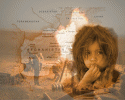
Information -
The Story Behind the Film
Asylum’ is dedicated to the children of Afghanistan
Iraq Iran and other areas of human conflict. We have enabled young
people who have been through unspeakable traumas, many of whom are still
in pain, to show us their experiences through drama, art and music. By
sharing their stories through their laughter and their tears, they are
able to begin to heal some of their wounds.
The Charity ‘Youth Support’ has been working with young refugees and
asylum seekers who arrive in foreign countries destitute and traumatised
having often travelled illegally stowed away in lorries and containers.
They are preyed on by ‘agents’ who traffic these ‘human commodities’ and
force them to face life threatening ordeals. Sadly when they arrive in
their new countries they do not always meet welcoming arms. They may
face prejudice, lack of understanding and further abuse.
Our aim in filming this project was to raise awareness of the plight of
these children who are caught in warfare through no fault of their own.
Children do not understand politics and our kids could come from
families on either side of warring divides.
We held several days of workshops based on psychodrama principles where we
filmed groups of young people as they acted, painted, danced and played.
Additional material was obtained from interviews and dramatisations and
animation clips were put together using the youngsters’ original art
work.
The subject matter is challenging and we explored violence, crime and
trafficking, pressures to join warring groups including the Taliban and
being forced to train as suicide bombers.
Three main areas are covered – the difficulties back home in their own
countries; the dangers faced on their journeys and the problems faced on
arrival. Finally we look at the ways that a happy ending can be achieved
and end on a positive note.
Why do children and young people have to leave their homes and countries
? Of course wars devastate families and cultures leaving children
orphaned and dispossessed. Warring factions may forcibly recruit child
soldiers taking them from their homes and forcing them to fight .. and
to die. Families are made to hand over their young boys and typically
children from age seven are trained and by 14 they are ready to be used
as ‘so –called’ suicide bombers. Some are even drugged whilst made to be
human bombs.
The boys’ journeys are fraught with danger. They have to walk until they
drop and the agent will not wait for anyone, they are jammed in lorries
often in perilous positions. Many die – crushed by the lorry axles,
falling out of vehicles, frozen in refrigerated storage, suffocated by
fumes in empty tankers ... Attacked by bandits, near starved by the
agents and resorting to eating grass en route. They drown in unseaworthy
boats or may be kidnapped by bandits. When Jamal fell overboard he
screamed for help and the agent pulled a gun on his friends and told
them to leave him. The agent had already been paid - so the safety of
his charges was of no concern.
The role of women, mothers, sisters and those left behind, was covered
in dramatisations based on original stories. Boys who act in what is
regarded as an inappropriate manner with a girl may have to escape for
their lives ... but the girl, who may only have held hands, may be
killed by her family.
The filming allowed these young people to communicate much more about
their ordeals than would normally be spoken of in an interview. We made
sure they understood the issues of confidentiality and maintained their
privacy by dramatising each other’s stories anonymously.
Once at their destination they face further problems and ‘Asylum’
explores the anger and frustration felt by children when they are
disbelieved with respect to their ages. Being abused by those they saw
as saviours, they become depressed, angry and can self harm. The
authorities seem like a faceless barrier who fail to see them as
individuals. We showed how they could release some anger in the drama
and used masks to convey the depersonalisation they experience.
Being dealt with as adults brings added traumas – such as being placed
in adult accommodation and thus at risk of abuse; being unable to fend
for themselves and also being jailed. Kids as young as thirteen can thus
be detained in an adult prison - although it is illegal to jail minors.
By allowing them to express their feelings we can improve our
understanding of their cultures and difficulties and can work together
to a positive future.
‘Asylum’ is a non-profit charitable production. We were helped by many
people who gave their time free of charge because they believed in our
work. We hope that this production will promote the needs and assist in the
welfare of children and young people throughout the world.


